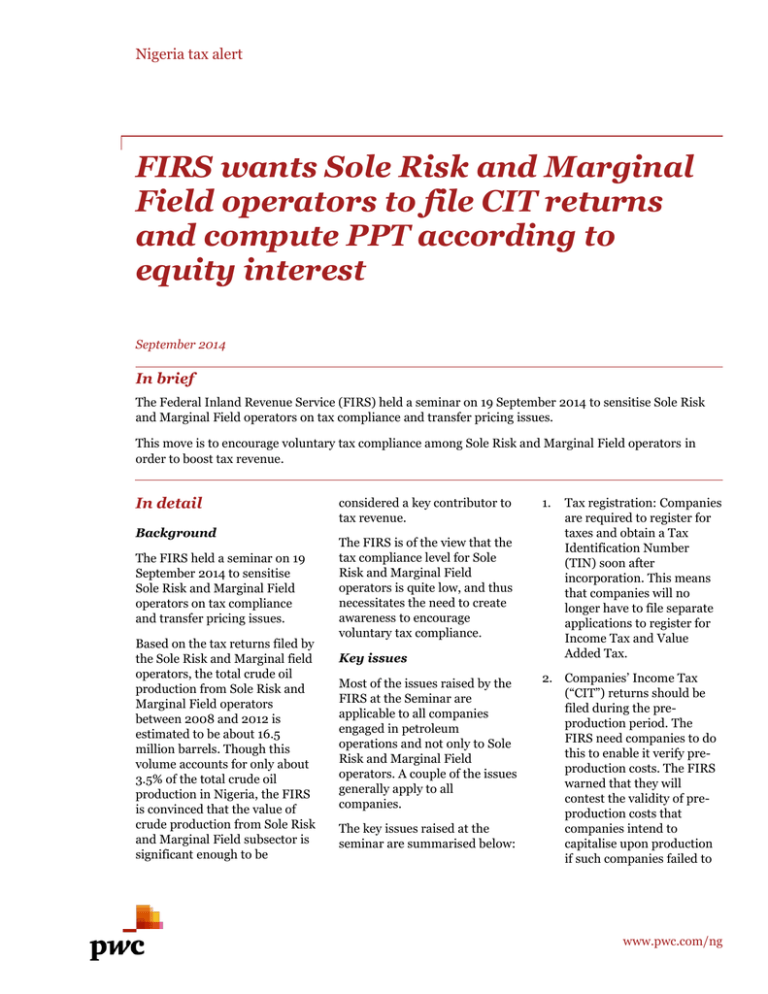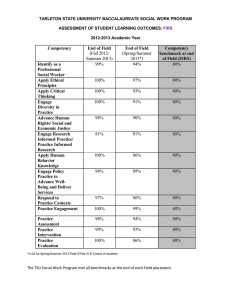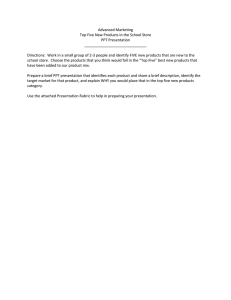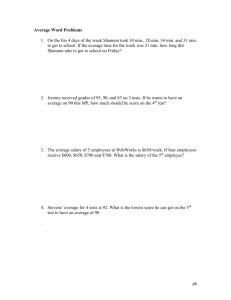
Nigeria tax alert
FIRS wants Sole Risk and Marginal
Field operators to file CIT returns
and compute PPT according to
equity interest
September 2014
In brief
The Federal Inland Revenue Service (FIRS) held a seminar on 19 September 2014 to sensitise Sole Risk
and Marginal Field operators on tax compliance and transfer pricing issues.
This move is to encourage voluntary tax compliance among Sole Risk and Marginal Field operators in
order to boost tax revenue.
In detail
Background
The FIRS held a seminar on 19
September 2014 to sensitise
Sole Risk and Marginal Field
operators on tax compliance
and transfer pricing issues.
Based on the tax returns filed by
the Sole Risk and Marginal field
operators, the total crude oil
production from Sole Risk and
Marginal Field operators
between 2008 and 2012 is
estimated to be about 16.5
million barrels. Though this
volume accounts for only about
3.5% of the total crude oil
production in Nigeria, the FIRS
is convinced that the value of
crude production from Sole Risk
and Marginal Field subsector is
significant enough to be
considered a key contributor to
tax revenue.
The FIRS is of the view that the
tax compliance level for Sole
Risk and Marginal Field
operators is quite low, and thus
necessitates the need to create
awareness to encourage
voluntary tax compliance.
Key issues
Most of the issues raised by the
FIRS at the Seminar are
applicable to all companies
engaged in petroleum
operations and not only to Sole
Risk and Marginal Field
operators. A couple of the issues
generally apply to all
companies.
The key issues raised at the
seminar are summarised below:
1.
Tax registration: Companies
are required to register for
taxes and obtain a Tax
Identification Number
(TIN) soon after
incorporation. This means
that companies will no
longer have to file separate
applications to register for
Income Tax and Value
Added Tax.
2. Companies’ Income Tax
(“CIT”) returns should be
filed during the preproduction period. The
FIRS need companies to do
this to enable it verify preproduction costs. The FIRS
warned that they will
contest the validity of preproduction costs that
companies intend to
capitalise upon production
if such companies failed to
www.pwc.com/ng
file CIT returns during their
pre-production period. The
FIRS is of the view that Sole
Risk and Marginal Field
operators are not exempted
from filing CIT returns with
reference to section 55 of
the CITA below:
“Every company, including
a company granted
exemption from
incorporation, shall, at
least once a year without
notice or demand thereof,
file a return with the Board
in the prescribed form and
containing prescribed
information together with
the following information
..."
In effect, such companies
that have not started
petroleum production
would now have to file CIT
returns during the
exploration stage.
3. Where companies engaged
in petroleum operations can
reasonably predict that they
will commence crude
production within an
accounting period, the FIRS
require such companies to
file their Petroleum Profits
Tax (PPT) estimated returns
ahead of production.
For instance, if a company
would commence
production in August 2015,
it is expected that it would
file its estimated tax returns
on or before the end of
February 2015.
4. The FIRS mentioned that
equity interest in an oil field
shall be the only basis for
reporting revenue and costs
for PPT purposes. The FIRS
insist on disregarding any
other basis, such as
economic interest, on the
PwC
basis that only the equity
interest basis is consistent
with the provisions of the
PPT Act.
5.
The FIRS will seize to
regard any joint filing of
PPT returns by Joint
Venture (JV) partners, if
such partners have not
obtained the requisite
approval of the Minister of
Petroleum Resources
(MPR), as required by
Section 23 of the PPT Act.
6. Though companies are
permitted to adopt any date
as their accounting year end
before commencement of
petroleum operations, the
FIRS suggested that
companies adopt 31
December to avoid issues
around change of
accounting year end that
may arise upon
commencement of
production.
7.
Companies in petroleum
operations may only
complete and file PPT
returns on the basis of the
FIRS PPT returns schedules
obtainable from appropriate
FIRS offices.
8. Separate CIT returns are to
be filed for profits earned
from outside petroleum
operations.
9. Companies with pioneer
status need to file PPT
returns notwithstanding
that PPT is not payable
during the pioneer holiday.
This will enable the FIRS to
verify the tax losses and
unutilised capital
allowances (or additions to
Qualifying Capital
Expenditure) accumulated
during the pioneer holiday
that a pioneer company
intends to utilise after the
holiday.
10. The FIRS expressed its
reservations on the granting
of pioneer status to
companies in petroleum
operations. The FIRS is of
the view that it is
inconsistent with the
provisions of the Industrial
Development (Income Tax
Relief) Act (IDITRA), as the
IDITRA refers to only the
CITA and not the PPTA as
its Principal Act. The FIRS
posits that it is being
compelled to accept the
position of the Nigerian
Investment Promotion
Council (NIPC), which
considers petroleum
operations as a pioneer
industry. The FIRS noted
that it will graciously accept
the legality of pioneer status
with open hands if the
IDITRA is appropriately
amended.
11. The basis of reporting
revenue for PPT purpose
shall be higher of NNPC’s
Official Selling Price (OSP)
or the company’s crude oil
sale proceeds, in compliance
with Sections 9 and 23 of
the PPT Act.
12. Withholding tax shall be
deductible from dividends
(payable to shareholders)
arising from exploration
and production of gas, on
the basis that gas income is
subject to tax under the
provisions of the CIT Act.
13. The FIRS strongly warned
against tax avoidance
schemes, as it insists that it
will always contest such
schemes to the fullest
extent.
Page 2
14. The FIRS mentioned some
allowable tax deductions
and tax incentives for
Marginal Field operators.
These include:
65.75% tax rate for
operators yet to fully
amortise their preproduction costs;
0% tax rate for gas
transferred from
natural gas to gas-toliquid facilities;
30% tax rate for
upstream gas income;
accelerated annual
allowances at 20% and
petroleum investment
allowance from 5% to
20% depending on the
water depth;
loss incurred may be
carried forward
indefinitely;
Exemption from further
tax in the form of WHT
on dividend paid;
All investments
necessary to separate oil
from gas reserves into
suitable product is
considered part of oil
development;
PwC
Capital expenditures
allowed for 100% writeoff with respect to:
intangible drilling cost,
exploratory & well
development cost; and
Costs incurred in the
drilling of the first two
appraisal wells in a field
shall be fully taxdeductible in the years
the costs were incurred.
Subsequent costs of
drilling appraisal wells
in the same field shall
be capitalised.
15. The FIRS enlarged the
scope of connected persons
for transfer pricing (“TP”)
purposes. For Sole Risk
companies, a risk service
contractor is considered to
be a connected person to the
Concession holders.
Marginal Field partners in a
JV are considered
connected to one another.
Any other party that has any
dealing in a marginal field is
connected to all partners in
the field.
16. Sole Risk and Marginal
Field operators are required
to maintain adequate
documentation for their
related/connected party
transactions.
17. The FIRS requires
companies to file annual TP
Disclosure and Returns in
line with the TP regulations.
Further comments on the
more critical issues
1.
Supremacy of equity
interest over economic
interest in computing PPT
The equity interests of
partners in a marginal field
are likely to be different
from the partners’ economic
interests. This typically
arises where a partner
assists another to meet its
cash calls. Economic
interests are based on actual
investments in a field.
In some other instances, a
different party that is not an
equity partner in a marginal
field may earn economic
interest in the field by virtue
of financing the interest of
an equity partner under a
carry arrangement.
Companies are deemed to
be in petroleum operations
only to the extent of their
equity interests. Any
additional investment is
akin to a financing
arrangement which needs to
be treated separately.
It is unclear whether the
FIRS will implement its
decision retrospectively.
This may have an adverse
effect on Modified Carry
Agreements that the NNPC
currently has with several
oil companies.
2. Timing of estimated PPT
returns
The position of the FIRS
suggests that it requires
companies to file estimated
PPT returns in advance if
they can reliably estimate
that crude production will
commence in the relevant
accounting year.
This position is inconsistent
with the provisions of
Section 33 of the PPTA,
which requires companies
to file estimated returns not
later than two months from
the commencement of each
accounting period.
The first day of the
accounting period of a
company that recently
commenced crude
production is the first day
the company makes a bulk
disposal of crude oil, based
on Section 2 of the PPTA.
For instance, if a Marginal
Field operator makes a bulk
disposal of crude oil on 1
August 2014, it could be
required to file its first
Page 3
estimated PPT returns not
later than 1 October 2014.
4. WHT on dividends from gas
income
3. Extension of meaning of
“Connected persons”
The deductibility of
withholding tax on
dividends arising from gas
profits appears to be
ambiguous. Section 60 of
the PPT Act exempts
withholding tax deductions
from dividends that arise
from profits that are taken
into account in calculating a
company’s chargeable
profits.
The FIRS disregarded the
core principle of control in
determining the scope of
connected persons for Sole
Risk and Marginal Field
operators.
Based on the provisions of
the PPTA and CITA,
persons may only be
connected to another where
one party controls the other
or both parties are
controlled by some other
persons.
On this basis, risk service
contractor would only be a
connected person to
Concession holder(s) if their
relationship results in some
form of control.
Based on Section 9 of the PPT
Act, only proceeds from the
disposal of chargeable oil are
considered in the calculation
of chargeable profits. To the
extent that gas profits do not
form part of chargeable
profits, dividends distributed
from gas profits may not
enjoy exemption from
withholding tax.
5.
Partners in Marginal Fields
and other parties that have
dealings with one or more
partners will only be
deemed to be connected to
the extent that control can
be established among them.
The only justification for the
FIRS’ position is where the
relationship is considered to
be “any arrangement”
designed to avoid tax or
which is capable of reducing
tax liability as stated in the
relevant laws.
Tax avoidance schemes
Companies need to seek the
FIRS ruling/clarification
where they intend to
implement tax planning
schemes that appears to be
aggressive. As a general rule,
tax rulings issued by the FIRS
cannot be relied upon if they
contradict the clear
provisions of the law.
The takeaway
pursued with vigour. On one
hand this is good but should be
carefully done after consultation
with stakeholders where
necessary.
The filing of CIT returns could
have significant tax implications
such as commencement, change
of accounting dates, and
cessation rules. In addition,
excess dividend tax may apply
on further distribution of the
petroleum profits by the
operators.
It is expected that the FIRS will
become a lot more aggressive in
its collection of taxes. It should
also be expected that the
chances of getting
concessions/waivers from the
FIRS will greatly reduce.
Sole Risk and Marginal Field
operators may need to boost
their capacity to enable them
comply with the extant tax laws
to avoid the imposition of stiff
penalties.
Where the issue is a question of
law, it is necessary for affected
parties to seek appropriate legal
opinion or a judicial
interpretation before changing
their existing filing practices
otherwise steps should be taken
to comply immediately.
The FIRS’ drive to increase tax
awareness, taxpayer education
and boost tax revenue is being
Let’s talk
For a deeper discussion of how this issue might affect your business, please contact:
PwC Nigeria - Tax and Regulatory Services Unit
PwC
Page 4
Insights
Taiwo Oyedele
+234 1 271 1700 Ext 6103
taiwo.oyedele@ng.pwc.com
Seun Ajayi
+234 1 271 1700 Ext 6158
seun.ajayi@ng.pwc.com
Rasidat Ogunbekun
+234 1 271 1700 Ext 6116
rasidat.ogunbekun@ng.pwc.com
Nojeem Yusuf
+234 1 271 1700 Ext 6178
nojeem.yusuf@ng.pwc.com
© 2014 PricewaterhouseCoopers Limited. All rights reserved. In this document, PwC refers to PricewaterhouseCoopers Limited (a Nigerian limited liability company),
which is a member firm of PricewaterhouseCoopers International Limited, each member firm of which is a separate legal entity.
2
pwc






